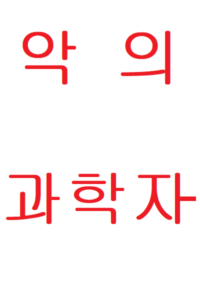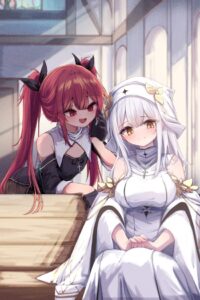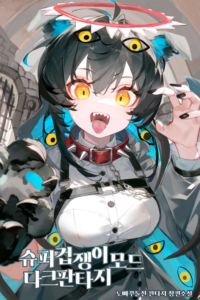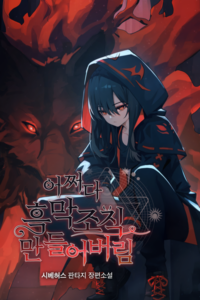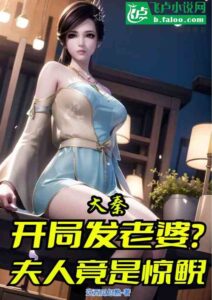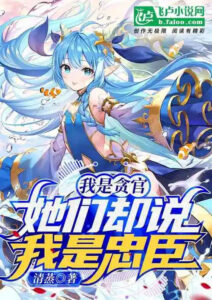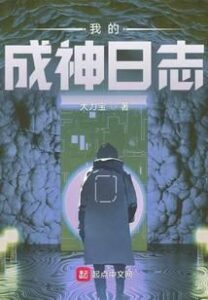Chapter: 101
Isolette let out a sigh and sat down across from me.
“You’re still the same, huh?”
“Am I?”
I fumbled for a response, so I just nodded in agreement.
Isolette grinned and propped her cheek up with one hand, gazing at me. Her slightly tilted stare felt incredibly profound.
“I saw The Wizard of Oz.”
“The movie? Or the book?”
“Both. The movie was beautiful, but… I think the book suits me better. Reading calms me down. Plus, when I read fairy tales… I think of you.”
“Huh?”
“I mean, I really enjoyed The Wizard of Oz. It was lovely. Truly.”
There was a deep affection in Isolette’s voice when she spoke of The Wizard of Oz.
She’s always shown a strong love for fairy tales. The Wizard of Oz, one of America’s favorite tales, must have felt like a precious gift to her.
“…And I’m thinking of becoming a literary critic.”
“Huh?”
“How many times have you told me that I have a knack for criticism, Ed? To be honest, I still dream of being a writer like you… but becoming a literary critic will surely help me write someday. After all, it’s about gaining experience and skills in the craft.”
“Ah.”
It was clear that Isolette had a keen insight into storytelling.
In my eyes, she was the most talented critic I knew.
“You seem really anxious.”
“Well, why wouldn’t I be? I’m basing all this on your word… If I fail as a literary critic, Ed, you’ll have to take the blame.”
“I’d better save you a spot at the Homer Foundation.”
“Who said anything about being responsible for a job?”
“And?”
“…I’ll just call all Homeric fiction a bunch of flimsy garbage.”
“…Pfft! You?”
That can’t be Isolette, who’s been singing Homer’s praises as if she’s one of his biggest fans.
With a pouty expression, she eyed me and let out a heavy sigh.
“Forget it. I made my choice anyway. It was just a joke; no need to worry about it.”
“Okay. What’s your first review going to be about?”
“I’m going to write about fairy tales. Like the Little Mermaid you mentioned in your ‘Stories for Children’… and other fairy tales known in the Empire, including The Wizard of Oz…”
“Really?”
“…And about the people beyond the yellow wall.”
“Huh?”
That doesn’t seem to relate much to fairy tales, does it?
Caught off guard by the sudden shift in topic, I felt a bit flustered.
Maybe sensing my reaction, Isolette tapped her fingers on the desk a couple of times and continued in a calm tone.
“I loved the innocence of fairy tales.”
“Innocence?”
“Yeah. I’m not sure how this will sound, but… the distance from reality outside the book felt greater than in other novels. It’s not about fidelity or realism, but… well, how should I put it? The atmosphere… yes, the atmosphere. Both The Little Prince and The Match Girl feel very distant from the complex issues in our society. The Match Girl even has a social commentary aspect, but ultimately, it’s really about the human heart, isn’t it?”
“Hmm.”
“In the end, it’s quite simple because fairy tales tell stories about ‘goodness’… The world as a child understands it, no matter how complex, exists only within the heart of a person… Just like they say, you can only see what truly matters with your heart…”
“Exactly. A child’s psychology and behavior may be complex, but that’s different from the complexity of society.”
While regular novels depict problems in a nuanced way through specific and personal descriptions, fairy tales lay it out straightforwardly, using powerful and effective symbolism. No matter how complex or convoluted a fairy tale may seem, this form doesn’t change.
In my past life, Disney was the best user of this technique in the 20th century.
As I wandered down memory lane, feeling a strange mix of emotions, Isolette kept talking.
“A child who breaks a taboo is cursed, while a child who repents and acts kindly is blessed—just like Karen from Little Red Riding Hood, who repented and went to heaven, or the Little Mermaid who, upon losing her voice, jumped into the sea and became an air elemental… Isn’t that a super clear and obvious symbol? Cursed prince, cursed princess, cursed girl, cursed boy… Fairy tales always follow this pattern. The ending always involves some good deed triumphing or ascending to heaven as a reward for enduring reality’s despair. I have written many such tales… and studied them too. All I could really do was learn the symbols and try to emulate them.”
“…….”
“But then, real life isn’t that simple.”
“…….”
“There are people who, even without a curse, are left with amputated ankles, and there are those who can’t speak even after sacrificing their leg for it. That’s not even a curse you can overcome or a test for heaven… I felt a little embarrassed, studying such ‘disabilities’ as if they were curses resulting from breaking taboos, a symbol of taboos… Meanwhile, those people are just living their lives in their own ways…”
“Ah.”
Now I finally got what she was trying to convey.
This was… a critique of the “ableist narrative” that has been pointed out multiple times in the 21st century—a voice for “equality” we often refer to as political correctness.
Why are princesses always portrayed as white and European, and why are Asians always described as mysterious merchants with slanted eyes?
These claims that fairy tales are a breeding ground for children’s ‘prejudice’ have been repeatedly asserted in the 21st century, and Disney, well, they’ve been very eager to ride that wave… with not-so-great outcomes.
“The Tin Man in The Wizard of Oz was cursed by a witch to become a scrap metal man… yet he never had to overcome that curse, nor did he need a new heart.”
“Hmm.”
“I’m still sorting through my thoughts, so it’s hard to clarify everything, but… yes, I was reading a book called ‘The People Beyond the Yellow Wall’… and it got me thinking.”
“…….”
“Maybe what the Little Mermaid truly needed wasn’t legs or a voice… but a way for two different people to connect.”
I could certainly add a few more stories to this.
For example, one could argue that the critique of “non-disability-centered narrative” is grounded in modern perspectives, where there are sufficient social safety nets for people with disabilities.
The Braille system used by visually impaired individuals was developed in the 19th century and was largely ignored during Braille’s life because it was deemed “hard for the able-bodied to comprehend.” The origins of sign language were for monks to practice silence, and even that was restricted to limited education in countries like France until the 18th century.
In times when universal welfare for productive populations didn’t even exist, the idea of “living with” a disability was downright modern.
Here, of course, I have a pretty good “safety net” thanks to my welfare foundation. So, Isolette’s statement that “disability isn’t a curse but rather a part of one’s life” could carry significant weight. Universal welfare here is somewhat on par with 21st-century South Korea.
And.
“Hey, that opinion… I like it. When you finish writing it, could you show it to me first?”
“Huh?”
“I’m curious. About your perspective on the world, Isolette.”
Great literature is inherently timely.
The new currents of the time, the fresh perspectives of the time, the pressing issues of the time—all these things inject life into literature. What makes literature ‘new’ rather than ‘old’ is the continual appearance of fresh opinions regarding the times.
Of course, using such perspectives to dissect existing classics (like the Little Mermaid back in my past life) without expressing them in their own writing… well, that’s not going to win any favor.
But as a critic, expressing such opinions is completely fine.
Sure, I might get a bit of backlash from the public, but being criticized is part of a critic’s job description. If you’re afraid of criticism, you might as well give up on evaluating others’ work altogether.
“Fairy tales, people beyond the yellow wall, and your take on The Wizard of Oz. I’m looking forward to your review.”
“…Haha, yeah. I’ll get it perfectly organized and show it to you, Ed, so stay tuned.”
Isolette and I exchanged glances and burst into laughter together.
.
.
.
“A critique from a politically correct perspective… Hmm, sounds good!”
The literary world thrives on villains.
Maybe it’s good that “political correctness” has revealed itself now, as literature is beginning to blossom. Discussing social and moral issues becomes quite hard to self-filter when media tools are being used as power instruments.
However, discussing these points purely from a literary perspective could be a way of preparing for the future.
“Well then, we should have a novel to fuel the debate…”
A novel that stands in stark opposition to political correctness. A novel where racism, blasphemy, intolerance, and all taboos are unapologetically explored.
I knew of such a novel.
“Zion.”
“Yes.”
“Let’s head to the vault.”
“What manuscript are you looking for this time?”
In response to Zion’s inquiry, I couldn’t help but smirk.
“Lovecraft.”
You may also like Mesugaki Tank Enters The Academy

